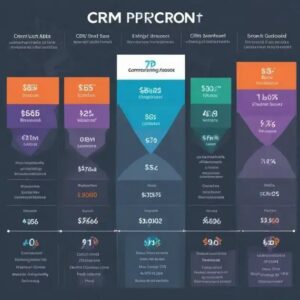Sales process software is a powerful tool that streamlines sales activities, enhances team productivity, and improves customer interactions. By automating tasks and providing essential analytics, it helps businesses optimize their sales strategies effectively.
Sales process software is transforming how businesses approach their sales strategies. It streamlines workflows, enhances team collaboration, and makes data-driven decisions easier than ever. In this article, we will dive deep into what sales process software is, explore its crucial features, and guide you through the selection and implementation process.
Understanding Sales Process Software
Sales process software is designed to help businesses streamline their sales activities, making them more efficient and effective. This type of software provides tools for managing leads, opportunities, and customer interactions throughout the sales funnel.
What is Sales Process Software?
Sales process software allows organizations to automate various stages of the sales process, from lead generation to closing deals. It helps sales teams track their progress, manage customer relationships, and analyze performance metrics. By centralizing important information, sales teams can better coordinate their efforts.
Key Components of Sales Process Software
These systems typically include features such as contact management, opportunity tracking, sales forecasting, and reporting tools. Some software also offers integration with email and other communication platforms, enhancing collaboration within the sales team.
Benefits of Using Sales Process Software
Implementing sales process software can significantly enhance productivity. It reduces the time spent on administrative tasks, allows for more personalized customer engagement, and improves data accuracy, leading to better decision-making.
Who Can Benefit from Sales Process Software?
Any business that relies on sales can benefit from using this type of software. Whether it’s a small startup or a large corporation, sales process software can help teams of all sizes optimize their strategies and drive better results.
Key Features of Sales Process Software

Sales process software is packed with features that can significantly improve productivity and streamline sales tasks. When evaluating these tools, it’s essential to understand what makes them effective for your sales team.
Contact Management
One of the core features is contact management. This allows users to store and organize all customer information in one place. It helps sales teams easily track interactions and access important details about clients.
Lead Tracking
Lead tracking capabilities enable businesses to monitor potential customers through the sales funnel. Sales teams can see where leads are in the process and what actions are needed to move them closer to a sale.
Sales Automation
Automation tools within the software help streamline repetitive tasks. This includes automated follow-up emails, reminders for meetings, and task assignments. Automation saves time and ensures that no lead slips through the cracks.
Reporting and Analytics
Access to real-time reporting and analytics allows teams to evaluate their performance quickly. By analyzing data, sales managers can identify trends, measure productivity, and adjust strategies as needed.
Integration Capabilities
Many sales process software solutions offer integration capabilities with other tools like email, CRM, and marketing software. This ensures that different aspects of the business can work together seamlessly, providing a more comprehensive view of customer interactions.
How to Choose the Right Sales Process Software
Choosing the right sales process software is crucial for maximizing the efficiency of your sales team. With numerous options available, it’s essential to evaluate your business needs before making a decision.
Assess Your Sales Process
First, map out your existing sales process. Understand the stages your team goes through, what tools you currently use, and where improvements are needed. This will help you identify which features are essential in new software.
Determine Key Features
Look for software that offers the features necessary to enhance your sales process. Essential features may include contact management, lead tracking, and reporting capabilities. Consider your team’s specific requirements and workflows to select software that meets those needs.
Consider Ease of Use
The software should be user-friendly and intuitive. A complex system can hinder productivity and lead to frustration among team members. Choose a solution that provides a smooth learning curve and quick adaptation.
Integration with Existing Tools
Ensure that the sales process software integrates seamlessly with the tools you’re already using, such as email platforms and CRM systems. This connectivity can save time and ensure a smoother transition between systems.
Evaluate Customer Support and Training
Lastly, assess the level of customer support offered with the software. Good customer support is vital for resolving issues and ensuring that your team can fully utilize the features. Additionally, consider whether the provider offers training resources to help your team get started.
Implementing Sales Process Software Successfully

Implementing sales process software successfully requires careful planning and execution. To ensure a smooth transition, it’s important to follow specific steps that can lead to positive outcomes.
Step 1: Prepare Your Team
Start by involving your sales team in the implementation process. Address any concerns they may have and explain the benefits of the new software. Ensuring buy-in from your team is essential for a successful transition.
Step 2: Set Clear Goals
Define what you hope to achieve with the new software. Establishing clear goals can help measure success later. This includes improved sales tracking, better data management, or enhanced customer communication.
Step 3: Data Migration
Transfer existing data into the new system carefully. Accurate data migration is critical as any errors can lead to confusion and inefficiencies later on. Test the transferred data to ensure it is correct and complete.
Step 4: Train Your Staff
Provide comprehensive training for your team. Tutorials, workshops, and ongoing support are vital to help employees learn how to use the new software effectively. Well-trained staff can utilize the system to maximize productivity.
Step 5: Monitor Progress and Gather Feedback
After implementation, regularly monitor how the software is performing. Gather feedback from your sales team to identify any challenges they may face and areas that need improvement. Addressing issues early can optimize the effectiveness of the software.
Measuring the Impact of Sales Process Software
Measuring the impact of sales process software is essential for understanding its effectiveness and ensuring that it meets your business goals. By analyzing specific metrics, you can determine how well the software is performing.
Key Performance Indicators (KPIs)
Establish clear Key Performance Indicators (KPIs) to evaluate the success of the software. Common KPIs include sales conversion rates, time spent on each sales stage, and the number of leads generated. These metrics provide insights into the efficiency of your sales processes.
Sales Team Performance
Monitor how the sales team is performing after implementing the software. Compare the performance before and after the software launch to spot improvements in productivity and efficiency. This can include tracking individual sales figures or overall team performance.
Customer Feedback
Collect feedback from customers about their experience. Positive feedback can indicate that the software helps improve customer relations and enhances satisfaction. Surveys and follow-up calls can yield valuable insights.
Reporting and Analytics
Utilize the reporting and analytics features of the sales process software. These tools can provide real-time insights into sales trends and help identify opportunities for improvement. Regularly review these reports to stay informed about your sales performance.
Adjustments Based on Data
Use the data gathered to make informed adjustments in your sales strategy. This might involve reallocating resources, improving training programs, or further customizing the software to align better with your sales processes. Regular adjustments based on metrics help in maximizing the effectiveness of the sales process software.
In Conclusion: Harnessing the Power of Sales Process Software
Implementing sales process software can transform how your business operates. It brings clarity and efficiency to workflows and helps sales teams perform better.
By understanding key features, choosing the right software, and measuring its impact, businesses can capitalize on the full potential of these tools. Test different options, gather feedback, and adjust based on your team’s needs for the best results.
Ultimately, sales process software is not just a tool; it’s an investment in future growth and success. Embrace it to enhance your sales strategy and build lasting customer relationships.
FAQ – Frequently Asked Questions about Sales Process Software
What is sales process software?
Sales process software is a tool designed to help businesses streamline their sales activities, manage leads, and enhance customer interactions throughout the sales funnel.
How can sales process software improve my sales team’s performance?
By automating tasks, organizing data, and providing analytics, sales process software helps teams work more efficiently and make informed decisions to drive sales.
What are the key features to look for in sales process software?
Look for features like contact management, lead tracking, sales automation, reporting capabilities, and integration with other tools you already use.
How do I ensure a successful implementation of sales process software?
Prepare your team, set clear goals, ensure smooth data migration, provide training, and monitor progress after implementation to achieve success.
How can I measure the impact of sales process software?
Use Key Performance Indicators (KPIs) like conversion rates, sales team performance, customer feedback, and reporting data to assess its effectiveness.
Is sales process software suitable for all business sizes?
Yes, sales process software can benefit businesses of all sizes, from small startups to large enterprises, by optimizing sales processes and enhancing productivity.




